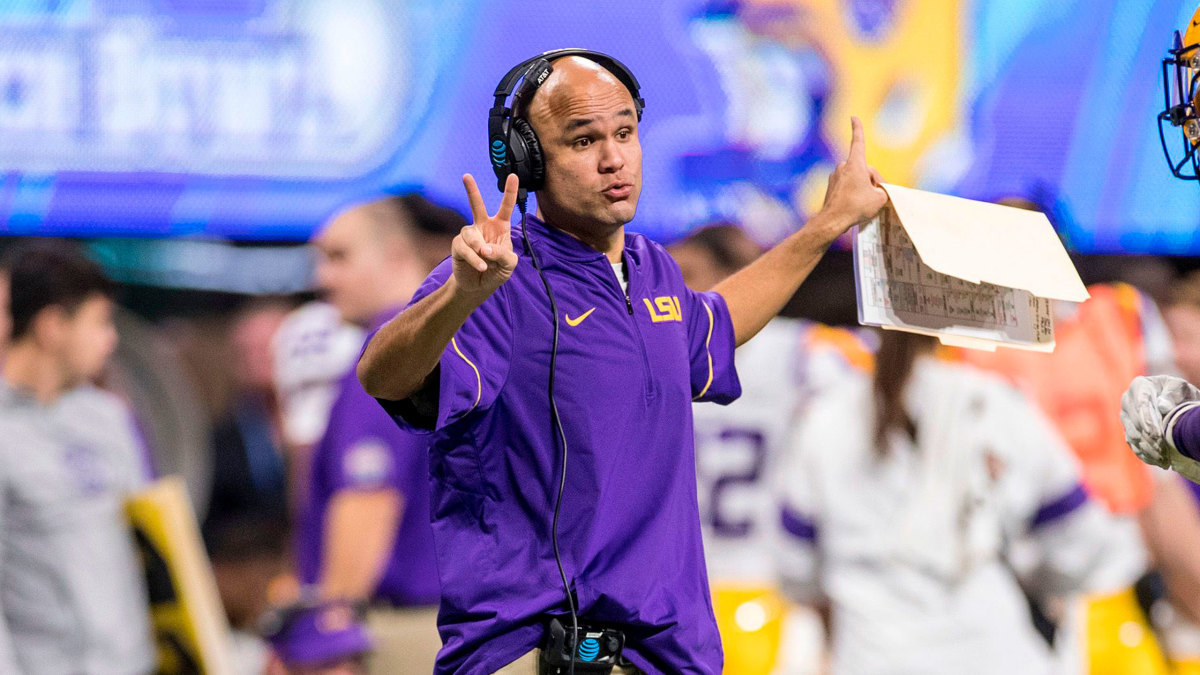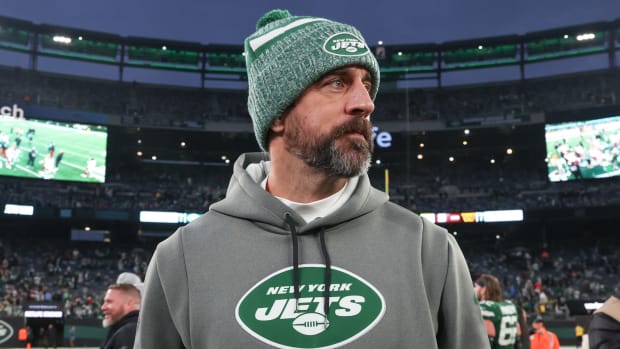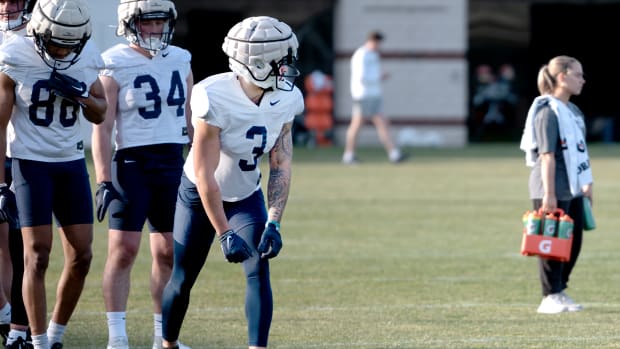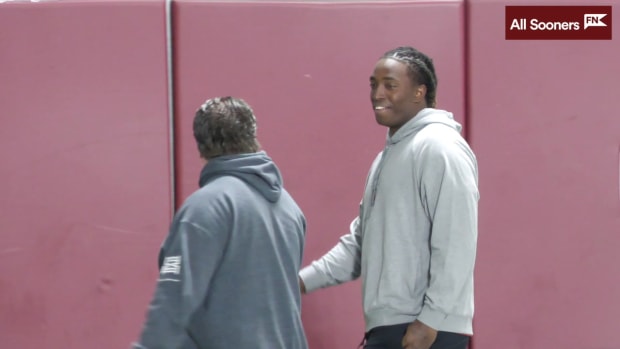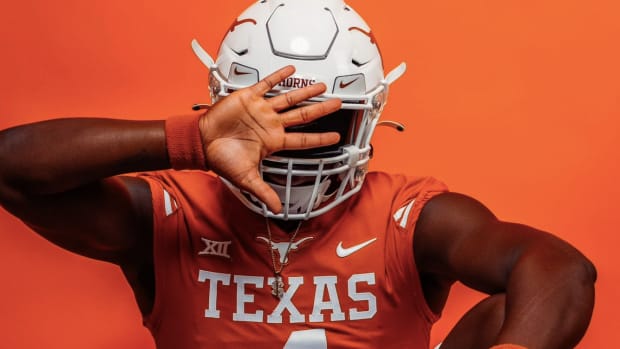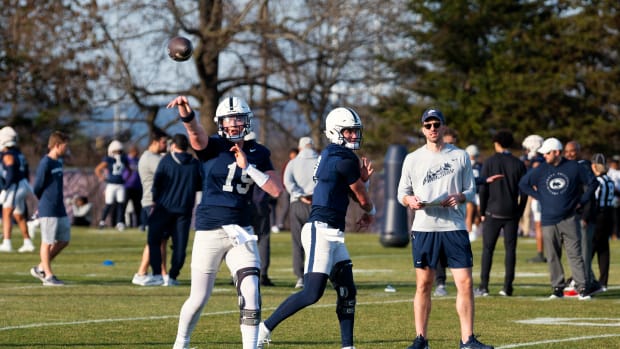The Background That Shapes Dave Aranda, Baylor's New Head Coach
Dave Aranda misses the tamales. While others feast on the usual American holiday treats—turkey and gravy, mashed potatoes and green been casserole—Aranda and his family ate tamales. And a lot of them. “It’s weird having Christmas without tamales,” he says in an interview last month with Sports Illustrated. “I would be crushing tamales throughout the lead up to Christmas.”
Baylor’s new head football coach is unique in many ways. Aranda was one of the most unusual longtime defensive coordinators in college football—quiet and cerebral, not a yeller or screamer. He never even played college football, and he originally wanted to enlist in the Navy. But nothing separates Aranda from others in the high-profile coaching fraternity more than his heritage—he’s Mexican American.
Decades after being raised as a Spanish-speaking child in southern California, Aranda landed his first head coaching job at a place with a sprawling Hispanic and Latino community deep in the heart of Texas. The nation’s highest paid assistant is now leading the Big 12 runner-up Bears, replacing Matt Rhule and ending a four-year stretch as LSU’s defensive coordinator. Three days after helping lead the Tigers to a national championship victory over Clemson in New Orleans, Aranda emerged as a top candidate at Baylor, a move SI first reported on Thursday. It came only after the school flirted with Virginia Tech coach Justin Fuente and interviewed Cajuns coach Billy Napier.
So what are the Bears getting in Aranda? Many in the industry call him one of the game’s best defensive minds, a 43-year old who captained some of the most successful defensive units in football at LSU and before that for three years at Wisconsin. Because of his cerebral nature, Aranda developed a host of nicknames over the years, most notably The Professor and The Defensive Coordinator Whisper. He’s a football nerd who will often talk about the “math of football” while babbling in technical jargon. Aranda’s scheme is built around “dictating” the terms of the game, a more offensive and attacking approach to defense.
Aside from football, Aranda is a married father of three with a background that few know about: He’s a minority, a man who embraced his Mexican roots in an interview last month with SI. Aranda says both of his parents’ families originated from the Guadalajara area, a six-hour drive west of Mexico City. He grew up speaking a mixture of English and Spanish. Can he speak Spanish today? “Yeah. Cuss words,” he laughs. “That’s all I remember.” Aranda is the 12th minority head football coach among the 65 Power 5 teams, it is believed. He’ll reside in Waco, a place in which about one-third of the population is either Hispanic or Latino. It’s similar to back in his home of Redlands, Calif., a quiet community at the foothills of the San Bernardino Mountains about 60 miles east of Los Angeles.
Paul and Marguerite Aranda raised two sons, Dave and Mike, and both got into coaching. Mike is an assistant basketball coach in Redlands. The boys didn’t grow up in an affluent home. Marguerite worked in the social security office, and Paul was a member of a prison parole board. Dave remembers spending hours after school at the YMCA while his parents worked. “We didn’t have a lot of money,” he says. “I just remember all the different people that are hanging out at the YMCA during the day. There would be so many different groups of people: the head bangers, the people who would study, the jocks, there would be the Mexican guys who didn’t speak English. I knew all of those people and could talk to them. I was really quiet always but could talk to them all. I cherished that experience.”
Mike and Dave were both active in sports growing up, but Dave never got to live his dream as a college football player. A Wing-T guard and linebacker, Dave injured his shoulder as a sophomore, something that lingered for years. He has undergone six—six—operations to the right shoulder, he said, and it prevented him from not only playing in college but competing at linebacker in high school. He was moved to the O-line. Dave was tough, even playing an entire half of football after re-injuring the shoulder in a playoff game. Afterwards, doctors X-rayed the arm—he had broken his shoulder. “He was a tough kid. He never came out,” says Miguel Olmeda, Aranda’s coach at Redlands High who he’s still close with. “He’s nails. If he would have played linebacker, he would have gotten recruited.”
Dave often pokes fun at himself over one aspect of his high school days: He was a terrible student. He was too focused on football and film sessions, Olmeda says, rather than Algebra and Geometry. Aranda kept reams of notebooks from the high school film sessions, and Olmeda believes he still has them in his possession. “To this day, he has a spiral notebook at this time full of Xs and Os,” Olmeda says. “He wanted to be a college coach in the worst way.”
At the start, Aranda learned the game on his own, often using the library in California as a tool, pouring over books and jotting down notes. While a student at Cal Lutheran, he studied Philosophy while rooming with Tom Herman, the current Texas coach. Aranda served on the football staff, moving up from the videographer to a student position coach and then a graduate assistant. He spent much of the offseason during those years traveling to various college campuses learning and digesting football. He drove to Arizona State, UCLA and to San Diego to visit the Chargers. He visited Southern Cal, too, meeting with a Trojans’ defensive graduate assistant, a guy named Dave Doeren, and he met with USC’s defensive line coach. His name: Ed Orgeron.
A sponge for knowledge and an architect of defense, Aranda developed a reputation as a guru, but he didn’t make it onto a big stage until Gary Andersen hired him as defensive coordinator at Utah State in 2009. It was a risky move—Aranda and the entire Hawaii staff had just been fired. “It’s hard to be fired in Hawaii,” Aranda said in an interview in 2016. “It’s probably the hardest place to get fired, the time change and all. I think people kind of forget you’re up there. I’ve never been one to work the phones or call. You’re basically kind of sitting around with no one calling.”
Since then, his defense has taken many shapes. While based out of a 3-4, his units are multiple and ever changing, with a host of different packages, and at times, he uses an amoeba formation. “He definitely has a little more of an attacking style of defense, man to man with the corners in some fashion,” LSU safeties coach Bill Busch said in a previous interview. “He likes to figure out ways to change things up. He’s extremely multiple. He has a few different packages.” Years ago, Karl Scott, now an assistant at Alabama, called Aranda the “smartest coach I’ve been around.” The two worked together for a year at Delta State in 2007. In coaching circles, Aranda is most known for using what he calls “creepers,” a simulated blitzer and something he developed over the years with former boss Ron Roberts, now the defensive coordinator at Louisiana. Former longtime coach and current Big Ten Network analyst Gerry DiNardo says Aranda calls plays like an offensive coordinator, always attacking.
His personality is the opposite, a somewhat soft-spoken man with a calming, gentle presence—far removed from the red-faced, high-pitched ol’ ball coach usually found in the defensive coordinator position. Aranda is such a quiet guy that teammates on his high school team in Redlands referred to him as The Fencepost, says Olmeda. “As quiet as you think he is now, he was almost mute in high school,” Olmeda laughs during an interview last month. “He was a kid of few words.” One former colleague said of Aranda, “He’s like a ninja.”
Aranda describes his childhood as “a little bit like it’s another life.” His parents didn’t raise him on football by any means. They knew very little about the sport until now, Aranda says. In fact, during football camps as a child, Aranda was the oddball kid, the one wearing the jeans and dress shoes. “I didn’t fit. But I didn’t know,” he says. “I always think of that when we have camps. We’ll have camps and I’ll see someone that would be me. I always spend time with them. It reminds me of my own experience.”
And now here he is, a Power 5 head coach, a minority with one of football’s biggest jobs. He’s prepared for this for years. “Bottom line,” he says in an interview last month, “is always be yourself.”
